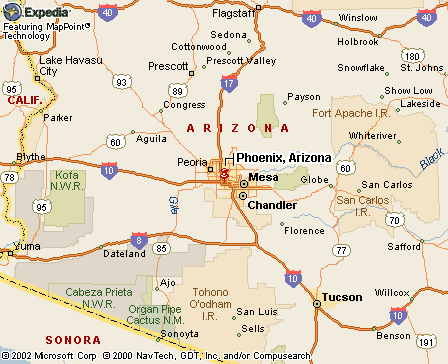|
|
Canku Ota |
|
|
(Many Paths) |
||
|
An Online Newsletter Celebrating Native America |
||
|
March 23, 2002 - Issue 57 |
||
|
|
||
|
Health Exec Helps to Bridge Cultures |
||
|
by Betty
Reid The Arizona Republic
|
||
|
Leland Leonard always wanted to escape from Navajo land, but he couldn't quiet the demons that forced him to battle substance abuse. Today the 49-year-old is chief executive officer of the Phoenix Indian Center, one of the largest urban Indian centers in America. What got him there? Colleagues and Valley Navajos say it was his persistence. "He is the spark plug of that operation," said Floyd Dallas, a housing specialist for the Western Regional Office of the Housing and Urban Development Department in Phoenix. "T'oo bahadzoo nitsekees," Dallas added, "he has a sharp, innovative mind." Diana Devine, executive director of Native American Connections Inc., said she met Leonard a decade ago. "He is a bridge because he makes them (newly arrived Native Americans) aware of issues that are here," Devine said. "He hooks them up with larger Native American communities." But Leonard's journey from Chinle included plenty of roadblocks. "In my wildest dreams, I never thought I would be CEO of any company," Leonard said. Opportunity beckoned in 1971 when Phoenix College invited the Chinle High School champion wrestler off of the reservation, and he bolted faster than lightening jumps across Canyon de Chelly during the monsoons. But Leonard wasn't ready to be a serious student. He longed to explore the world and, coming from a family of Navajo Code Talkers, he enlisted in the Marines. The Vietnam War ended before he saw action, but another battle waited on the home front. Torn inside by his brush with modern society, followed by a quick thrust back into Navajo life, Leonard felt "disjointed" and alienated from home and the land. He quickly became a regular customer at border town bars, then left for Los Angeles on his continuing quest to see the world. In 1977, Leonard returned to Chinle and declared war on the demons. He threw himself into treatment and sought the help of traditional medicine men to regain harmony, a philosophy crucial to a Navajo's soul. "My ego and core value were struggling," Leonard said. "I look back now and see it as an experience to learn from. I never took another drink." He attended the University of Arizona and picked up a bachelor of science degree in education, with a major in rehabilitation. He got a master's in counseling at Northern Arizona University. Leonard's work with Public Indian Health Service started in 1985 in Tuba City, a town in the western portion of the Navajo Reservation. Mental illness had just become a public issue for the Navajos, a nation that urged internal strength as the answer to stressful situations. The tribe finally acknowledged that it must accept modern medicine and treatment to battle issues such as depression, substance abuse and domestic violence. "All of sudden, people walked out of the closet," Leonard remembered. "I think there was a gap in our cultural teaching because it wasn't passed down to our younger people and it wasn't public information." In 1991 Leonard transferred to the health service's Phoenix area office, in part to deal with the large numbers of tribal members who migrate to larger cities seeking a job or an education. Or fleeing tribal law. "For those who come to Phoenix with their problem," Leonard said, "they joined the misery parade." In 1997, he snared the executive director's post at Phoenix Indian Center and started learning the different values and lifestyles of urban Native Americans from 81 tribes. "Here, we tell our kids to put on their pants the same way non-Indians do," Leonard said. "It starts with how you look at yourself. On the rez, it's about staying on an even keel with your family, extended kin and the land. The sky is the limit here." For many Arizona tribal members, the paved roads are the way home: They soak up their own culture on weekends or vacations before returning to the Valley. There also are powwows, potlucks and the Phoenix Indian Medical Center to draw Native Americans together. Still, the erosion of culture and the language can be frightening for urban Indians. In response, Leonard and his staff at Phoenix Indian Center created language learning classes covering the Hopi, Gila River and Navajo languages. "This identity issue is very important to our young people," Leonard said. "I'm fortunate to speak Navajo. This is our way of connecting urban American children to who they are."
|
||||
|
|
||
|
|
||
| Canku Ota is a free Newsletter celebrating Native America, its traditions and accomplishments . We do not provide subscriber or visitor names to anyone. Some articles presented in Canku Ota may contain copyright material. We have received appropriate permissions for republishing any articles. Material appearing here is distributed without profit or monetary gain to those who have expressed an interest. This is in accordance with Title 17 U.S.C. section 107. | ||
|
Canku Ota is a copyright © 2000, 2001, 2002 of Vicki Lockard and Paul Barry. |
||
|
|
|
|
|
The "Canku Ota - A Newsletter Celebrating Native America" web site and its design is the |
||
|
Copyright © 1999, 2000, 2001, 2002 of Paul C. Barry. |
||
|
All Rights Reserved. |
||


